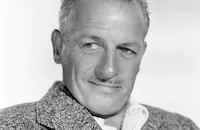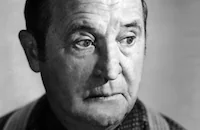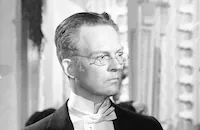Over My Dead Body
Brief Synopsis
Cast & Crew
Malcolm St. Clair
Milton Berle
Mary Beth Hughes
Reginald Denny
Frank Orth
William Davidson
Film Details
Technical Specs

Synopsis
In the opinion of his wife Patricia, mystery writer Jason Cordry is incapable of completing a single task. Knowing this, she listens with skepticism as he tells her his latest idea for a novel: A wealthy broker commits suicide and a stranger proposes to the broker's unscrupulous partners that he make the suicide appear to be a murder in exchange for a fee of $50,000. The partners agree to the scheme and "borrow" $50,000 from the company coffers to pay the stranger. Pat interrupts Jason's story to ask him how he intends to have the stranger elude capture. When Jason fails to provide a satisfactory answer, she flies into a rage. Later, at the Hollywood brokerage office where Pat works, broker Tom Mardley threatens to have his three partners, Lawrin, Crole and Brenner, arrested for stealing money from their investors unless they return the money. Mardley then takes $15,000 from Lawrin as a downpayment on the return of the stolen money. The following day, Jason shows up at Pat's office to tell her that he has come up with an ending for his story. Just as he is about to tell her what it is, though, Pat learns that her bosses are on their way down, and she hides Jason in the board room. While the bosses hold a meeting in the board room, Jason remains hidden in a closet. During the meeting, Jason overhears Lawrin and Crole report to Brenner that Mardley has committed suicide and that they have the $15,000 he took from Lawrin. As the men try to figure out how they will escape being discovered by the police when their books are checked, Jason, who recognizes the similarity between his mystery plot and that of the brokers' predicament, steps out of the closet and assumes the role of "the stranger" in his story. The men, desperate for a solution, take up Jason's proposition to make Mardley's suicide appear to be a murder and pay him $15,000. Jason then hurries to Mardley's apartment at the Clexton Terrace, where he takes the suicide note and rearranges the apartment so that it will appear obvious that Mardley was murdered. On his way out, Jason makes certain that the elevator operator remembers his face. He then disguises himself as a foreign dignitary and posts an announcement in the newspapers that the wealthy and generous Baron La Roux has arrived in town and will be holding court at the Clexton Terrace Apartments. As part of his plan to confuse the elevator operator, who will be the key witness in the murder trial, Jason returns in diguiese to the hotel to have his picture taken with the boy. Jason's plan goes awry, however, when the elevator boy immediately recognizes Jason behind his disguise. Charged with Mardley's murder, Jason is arrested and thrown in jail. In his cell, Jason reads in the newspaper that in college Mardley was a left-handed baseball pitcher and, remembering that he found the gun in Mardley's right hand, concludes that Mardley was, indeed, murdered. Determined to clear himself of the charges, Jason disguises himself as his cellmate Petie and walks out of his jail cell. Jason then goes to Pat's brokerage office, where he asks the partners for help in solving the murder. The men show no interest in helping Jason, and Lawrin pulls a gun on him. Jason manages to escape, and when he meets up with Pat, she recognizes the gun as Mardley's. While rummaging through Mardley's apartment looking for his gun license, Jason is discovered by the police and is taken to court. At his trial, Jason cleverly wins his acquittal when the elevator boy is unable pick him out of a line-up of movie extras disguised as Baron La Roux. Not entirely satisfied with a simple acquittal, Jason surprises the court by proving that Mardley was forced to write his alleged suicide note by the man whose telephone number is scribbled on the note. Jason then accuses Brenner of the murder, and when Brenner tries to flee the courtroom, his guilt is proven. With the mystery solved, Jason returns to his writing and begins a new story. Pat asks him how this one will end, and when he says that he does not know, she loses her temper.

Director
Malcolm St. Clair
Cast

Milton Berle
Mary Beth Hughes

Reginald Denny

Frank Orth

William Davidson
Wonderful Smith
J. Patrick O'malley
George Carleton

John Hamilton
Jill Warren
Milton Parsons
Leon Belasco
Charles Trowbridge
Bud Mccallister
Cyril Ring
Edwin August
Emory Parnell
Ed Gargan
Frances Morris

Don Dillaway
George Riley

George Andre Beranger
Joseph J. Weston
John Dilson

Siegfried Arno
Sam Wren
Dave Willock
Joseph Kirk

Ann Todd
Leon Taylor
Crew
Lucien Andriot
Lewis Creber
Richard Day
William Goetz
Herschel
Percy Ikerd
Edward James
Arthur Von Kirbach
Harry M. Leonard
Thomas Little
Cyril J. Mockridge
Walter Morosco
Emil Newman
Fred J. Rode
J. Watson Webb

Film Details
Technical Specs

Quotes
Trivia
Notes
The credits for this film, which were not available for transcription from the viewed print, were taken from studio publicity materials and the CBCS. While the SAB notes that this film was based on James O'Hanlon's novel As Good as Murdered, news items in Hollywood Reporter and Daily Variety in April 1942 suggest that it was based on an original story by O'Hanlon entitled "This Little Pig Went to Murder." The news items also state that O'Hanlon was set to write the screenplay and that he would expand the short story into a novel that was to be released coincidentally with the release of the film. A September 1942 Hollywood Reporter news item notes that Milt Gross was hired by the studio to "write ads" for the picture.

Miscellaneous Notes
Released in United States 1942
Released in United States 1942











